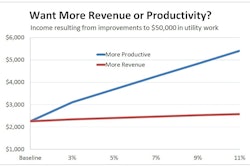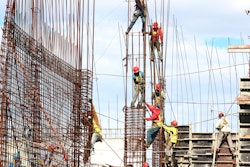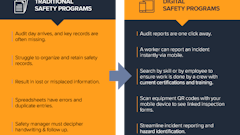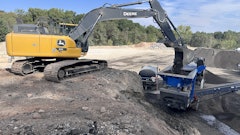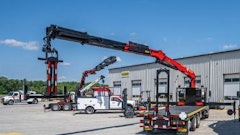
Improving productivity is an ongoing challenge for construction businesses all over the world. Though the construction industry is one of the leaders in the world's economy, it lacks when it comes to productivity.
According to January 2021 reports by ResearchAndMarkets.com, the worldwide construction industry is projected to reach an estimated $10.5 trillion by the year 2023, growing at a CAGR of 4.2% from 2018 to 2023. Due to the increasing urbanization in many countries around the globe, business is flourishing for the construction industry. However, to fully embrace such immense growth and demand, the industry needs to solve its biggest problem which is related to productivity and complex business operations.
Despite having huge demand and scope, the construction industry has always performed inadequately, as per research by McKinsey. It represents 13% of the global GDP but has experienced a productivity growth of only one percent per year for the last 20 years.
It might be an overwhelming situation, but it is not impossible for construction businesses to find solutions. Even small improvements in the way this industry works can create major benefits for all the stakeholders. By streamlining operations using emerging tools and technologies, construction businesses can reduce required efforts and increase productivity.
5 Ideas to Improve Your Company's Productivity
1. Plan for Productivity Before You Start
When working on a construction project, it is crucial to plan everything to stay organized and drive desired results. If your team isn't organized and lacks understanding, it will harm productivity and increase the overall time and cost of the project. Therefore, before you start any construction project, a plan must be in place. The more well-researched plan you make, the higher will be your team's productivity.
You can start making a plan by creating a PID (project initiation document), which lists the number of workers needed, the quality of materials required, and the total cost of the project including materials, permits, equipment, etc. The objective of drafting this document should be to outline the resources, money, and time required to complete the project. This plan will eventually help you manage the entire project as per your expectation by tracking the productivity of each resource.
Along with a PID, it is also essential that you set clear goals for your project. You'll take the particular resources you listed in the PID and use that to form a broader strategy around project execution. After setting these goals, get your team members on board, hold a meeting and talk about expectations from every member.
Also, ask your team if there are any possible obstacles in the planned process. This way, you will be able to keep every stakeholder of your project on the same page. Moreover, when your team understands the work process from the earliest starting point, it prevents resource misallocation, mismanagement, and most importantly boosts productivity.
To make sure your project executes as intended, you can use construction management software with in-built tools that will help you track each phase of your construction project.
2. Ensure Proper Communication
Construction projects involve designers, builders, architects, and several other stakeholders. Therefore, to ensure proper working on a project, one must ensure there is no breakdown in communication between them. Improper communication can cause information loss which may lead to rework, waste, and of course, loss of productivity. Miscommunication in construction projects is responsible for 48% of all rework in the USA, as per an August 2018 FMI report. Therefore, even after making a full-fledged construction plan, you can not claim that you solved the productivity problem altogether without ensuring there is proper communication between your team members.
Poor communication is one of the reasons behind the lack of productivity in almost all industries. However, in the construction industry, it can have an immense and negative impact on the final results. Steady and effective communication among project managers, supervisors, and owners will help prevent errors and increase the overall team's productivity.
Along with improving communication between the team, construction businesses should also communicate the importance of productivity to their team members. These businesses should invest in training their supervisors to help them learn effective communication techniques.
Educate them on the best ways to improve communication and define incentives to help them achieve their goals. You may use a project management system created specifically around workflows to improve communication between your team members.
3. Streamline Operations using Online Tools
When it comes to increasing the productivity of your team, investing in online tools and technologies that let you manage the entire project seamlessly is a smart decision. Today, there are many construction management software and mobile solutions available online that can help managers oversee every aspect of the project. From managing back office to field reporting, preconstruction to scheduling, there is software for everything that can help you organize your process and find ways to execute them smartly. Most of these online construction management solutions are cloud-based that allow you to make changes to schedules and documents in real-time for better team collaboration.
These cloud-based solutions let on-site employees submit RFIs, timecards, and other documents in a few taps which can save hundreds of hours annually spent in data entry. If used in the right way, these software solutions can increase productivity in construction to many folds from what it is today.
4. Leverage Emerging Technology
With the use of emerging technologies like artificial intelligence, machine learning, and wearables, the construction industry can boom in productivity. A lot of construction businesses are already using data to make informed decisions, improve safety, reduce risks, and increase productivity.
For example, open issues, change in orders, and requests for information are very common in construction. ML helps scrutinize this data and lets project managers know the crucial things that need their attention. Another application of AI in construction is preventing cost overruns.
Construction firms use artificial neural networks to predict cost overruns depending on factors like contract type, project size, and competence level of project managers. Also, there are companies that are using self-driving machinery to complete redundant tasks such as bricklaying, pouring concrete, and welding. This lets human workers focus only on design and construction by reducing the overall time needed to complete a project.
Also, project managers can track everything easily using AI. They can use onsite cameras, facial recognition, and other methods to assess productivity and performance. Businesses can also opt for a construction management software solution having built-in artificial intelligence. This kind of solution can not only increase productivity but can reduce risks and minimize the overall cost of the project.
5. Reduce Meetings
Though meetings are crucial for effective team collaboration and defining processes, if conducted too frequently meetings can kill time and productivity in the long run. Thus, by conducting fewer meetings with clear agendas, you can actually work more and increase productivity.
Start by making a schedule for the meetings and specify the start and end timings. This will guarantee that those required around them are completely prepared and know precisely how long they need to discuss anything or give updates inside a given time span. Furthermore, during each meeting, ensure to delegate duties and relegate a "directly responsible individual" to follow for specific tasks.
A Final Thought
With the demand in the construction industry increasing, the pressure on construction businesses to act is also rising. As leading organizations are transforming fast by adopting technological solutions and following other best practices, they will pave the way for the rest of the industry to embrace this change. However, there is no doubt in saying that players that don't reevaluate their approaches will be left behind.
About the author
Ed Williams is the Senior Team Lead at ProjectPro, an integrated construction accounting software. He has a lot of industry experience and is a Microsoft Dynamics expert who is focused on successful implementations. He is a visionary leader and always aims to deliver the best to the construction and project-oriented industries.





![[VIDEO] Why a Project Communication Plan is Key To Effective Communication In Projects](https://img.forconstructionpros.com/files/base/acbm/fcp/image/2015/10/default.561e64890782b.png?auto=format%2Ccompress&fit=crop&h=167&q=70&w=250)
